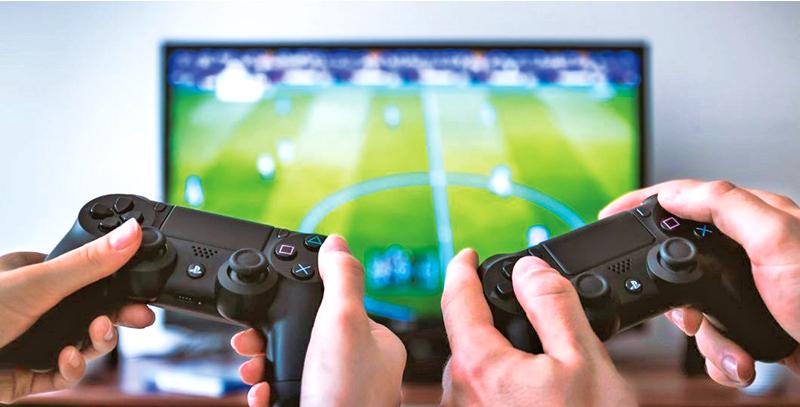
Video games have become an integral part of global urban culture. In Sri Lanka, too, it is getting popular among the children in cities and suburban areas. Are video games good or bad for children? In the past two decades, this question has become a hot topic of discussion, especially, in the media.
According to an article published in ‘Paediatrics: the Official Journal’ of The American Academy of Paediatrics, we may be mistaken in our thinking about how video games impact the behaviour of children.
Author Andrew K. Przybylski, PhD., conducted a study in 2014 with 2,436 males and 2,463 females, ranging 10 to 15 years old. Entitled “Electronic Gaming and Psychosocial Adjustment,” Dr. Przybylski’s study looked at how different amounts of game play impact the gamers.
He says, “We found that in most cases, gaming is beneficial. Compared with non-players, children who typically invest less than one-third of their daily free time showed higher levels of pro-social behaviour and life satisfaction and lower levels of conduct problems, hyperactivity, peer problems, and emotional symptoms.”
Behaviour issues
However, a new study done in 2018, published in the journal, ‘Proceedings of the National Academy of Sciences’, says by allowing children to play them for too long could make them aggressive. Researchers at Dartmouth University examined the results of 24 studies between 2010 and 2017, including over 17,000 participants from nine to 19 years.
Each study looked at how violent video games affected the children’s real-world behaviour, including their aggression.
The participants were followed up to four years. The team concluded that there was significant evidence from the analysis that video games can contribute to heightened aggressive behaviour among children.
Simple benefits
Yet, some child psychologists suggest that video games could have many simple benefits, especially, bearing in mind that “the nature of these games has changed dramatically in the last decade, becoming increasingly complex, diverse, realistic, and social in nature.”
Let us look at them.
1. Working together as a team
Most games these days are played online or have a multi-player mode that allows your kid to play it with their friends. This helps in building the skills required to work together as a team and solve problems together.
2. Better decision making
Games function in real time and most games are fast paced that require the player to make quick decisions in a short time. This helps in sculpting the decision-making skills in a child that are necessary for certain real-life applications like sports or medicine, where split-second decisions need to be taken under pressure.
3. Maintaining accuracy in fast decisions
Making quick decisions is of no use if they are going to be wrong. Video games help your kid maintain a good level of accuracy by learning to calculate all the dependent parameters fast. In fact, the US Army advises its soldiers to play video games to sharpen their short-term decision-making skills.
4. Coordination between hands and eyes
Developing the skills to control motor functions without looking at them takes a good amount of time. By playing video games, kids begin to learn what movement of their limbs would have an effect to what degree in the space and visual references before them. This hand-eye coordination is required in nearly all sports.
5. Better cognitive functioning
When a certain skill is repeated multiple times, the brain starts developing its structure and creates new neural pathways and transmitters to optimize its functioning. This has been observed in musicians and artists and is also seen while playing video games. In instances when intense concentration is applied, the brain moulds itself to be able to solve problems faster, which can ultimately help in solving issues in real life.
Drawbacks
They also suggest a few disadvantages:
1. Health issues
Kids who spend a lot of time playing video games instead of indulging in physical activities could harm their health in many ways. Sitting in one place and playing video games at length can increase the chances of obesity, weaken the muscles and joints, and make hands and fingers numb due to over-exertion.
2. Academic issues
The excitement and fun that video games provide are in stark contrast to a typical day in school. This could cause kids to prefer video games over anything else and fail to pay attention at school. Even outside school, they may skip homework or studying for tests and choose to play video games instead, resulting in poor performance.
3. Exposure to wrong values
Many video games contain excessive violence and other aspects that cannot be perceived by kids in the right manner, and thus they end up trying to emulate the same behaviour as portrayed in the games.
4. Aggressive behaviour
The violent content in video games and the instant gratification they provide can cause kids to be impatient and aggressive in their behaviour. When things fail to go as planned or any restrictions are laid, they can lash out or start harbouring aggressive thoughts that can manifest in troublesome behaviour.
Verdict
What’s the final verdict? Are video games good or bad? Technically, video games are just games with a visual component, and can be more social and distracting due to constant availability.
They can be used as powerful teaching and skill-honing tools but can also be over-used and have an overwhelming effect on a child’s life if they frequently get violent and frustrated while playing games.
It all comes down to appropriate and moderate use. Video games are fun and can sometimes enrich a young person’s life and create happiness, but they shouldn’t be used as a substitute for living your life outside a video game.
Young children, especially, have problems with this line, so parents need to help them by providing understanding, support, and guidance while also imposing rules when necessary.
